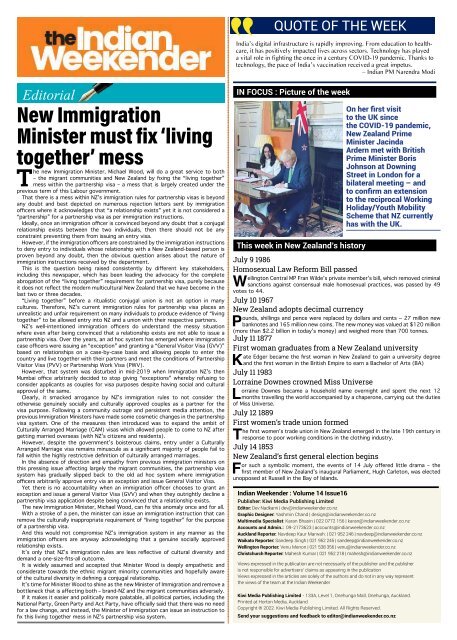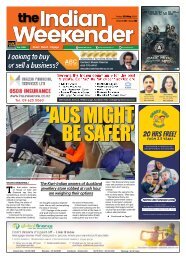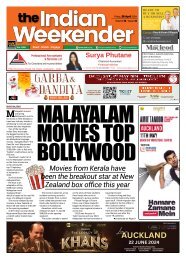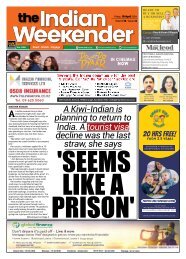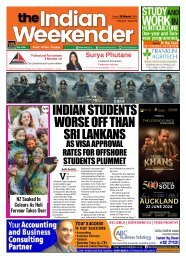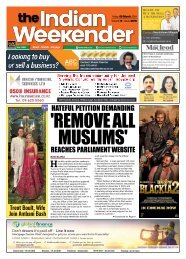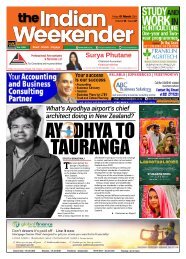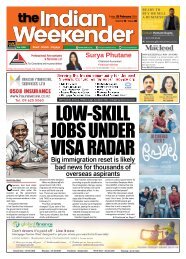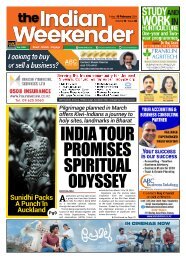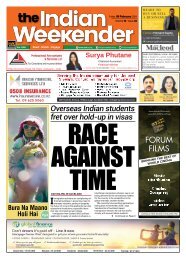The Indian Weekender, Friday 8 July 2022
Create successful ePaper yourself
Turn your PDF publications into a flip-book with our unique Google optimized e-Paper software.
QUOTE OF THE WEEK<br />
India’s digital infrastructure is rapidly improving. From education to healthcare,<br />
it has positively impacted lives across sectors. Technology has played<br />
a vital role in fighting the once in a century COVID-19 pandemic. Thanks to<br />
technology, the pace of India’s vaccination received a great impetus.<br />
– <strong>Indian</strong> PM Narendra Modi<br />
Editorial<br />
New Immigration<br />
Minister must fix ‘living<br />
together’ mess<br />
<strong>The</strong> new Immigration Minister, Michael Wood, will do a great service to both<br />
– the migrant communities and New Zealand by fixing the “living together”<br />
mess within the partnership visa – a mess that is largely created under the<br />
previous term of this Labour government.<br />
That there is a mess within NZ’s immigration rules for partnership visas is beyond<br />
any doubt and best depicted on numerous rejection letters sent by immigration<br />
officers where it acknowledges that “a relationship exists” yet it is not considered a<br />
“partnership” for a partnership visa as per immigration instructions.<br />
Ideally, once an immigration officer is convinced beyond any doubt that a conjugal<br />
relationship exists between the two individuals, then there should not be any<br />
constraint preventing them from issuing an entry visa.<br />
However, if the immigration officers are constrained by the immigration instructions<br />
to deny entry to individuals whose relationship with a New Zealand-based person is<br />
proven beyond any doubt, then the obvious question arises about the nature of<br />
immigration instructions received by the department.<br />
This is the question being raised consistently by different key stakeholders,<br />
including this newspaper, which has been leading the advocacy for the complete<br />
abrogation of the “living together” requirement for partnership visa, purely because<br />
it does not reflect the modern multicultural New Zealand that we have become in the<br />
last two or three decades.<br />
“Living together” before a ritualistic conjugal union is not an option in many<br />
cultures. <strong>The</strong>refore, NZ’s current immigration rules for partnership visa places an<br />
unrealistic and unfair requirement on many individuals to produce evidence of “living<br />
together” to be allowed entry into NZ and a union with their respective partners.<br />
NZ’s well-intentioned immigration officers do understand the messy situation<br />
where even after being convinced that a relationship exists are not able to issue a<br />
partnership visa. Over the years, an ad hoc system has emerged where immigration<br />
case officers were issuing an “exception” and granting a “General Visitor Visa (GVV)”<br />
based on relationships on a case-by-case basis and allowing people to enter the<br />
country and live together with their partners and meet the conditions of Partnership<br />
Visitor Visa (PVV) or Partnership Work Visa (PWV).<br />
However, that system was disturbed in mid-2019 when Immigration NZ’s then<br />
Mumbai office arbitrarily decided to stop giving “exceptions” whereby refusing to<br />
consider applicants as couples for visa purposes despite having social and cultural<br />
approval of the same.<br />
Clearly, it smacked arrogance by NZ’s immigration rules to not consider the<br />
otherwise genuinely socially and culturally approved couples as a partner for the<br />
visa purpose. Following a community outrage and persistent media attention, the<br />
previous Immigration Ministers have made some cosmetic changes in the partnership<br />
visa system. One of the measures then introduced was to expand the ambit of<br />
Culturally Arranged Marriage (CAM) visas which allowed people to come to NZ after<br />
getting married overseas (with NZ’s citizens and residents).<br />
However, despite the government’s boisterous claims, entry under a Culturally<br />
Arranged Marriage visa remains minuscule as a significant majority of people fail to<br />
fall within the highly restrictive definition of culturally arranged marriages.<br />
In the absence of direction and empathy from previous immigration ministers on<br />
this pressing issue affecting largely the migrant communities, the partnership visa<br />
system has gradually slipped back to the old ad hoc system where immigration<br />
officers arbitrarily approve entry via an exception and issue General Visitor Visa.<br />
Yet there is no accountability when an immigration officer chooses to grant an<br />
exception and issue a general Visitor Visa (GVV) and when they outrightly decline a<br />
partnership visa application despite being convinced that a relationship exists.<br />
<strong>The</strong> new Immigration Minister, Michael Wood, can fix this anomaly once and for all.<br />
With a stroke of a pen, the minister can issue an immigration instruction that can<br />
remove the culturally inappropriate requirement of “living together” for the purpose<br />
of a partnership visa.<br />
And this would not compromise NZ’s immigration system in any manner as the<br />
immigration officers are anyway acknowledging that a genuine socially approved<br />
relationship exists.<br />
It’s only that NZ’s immigration rules are less reflective of cultural diversity and<br />
demand a one-size-fits-all outcome.<br />
It is widely assumed and accepted that Minister Wood is deeply empathetic and<br />
considerate towards the ethnic migrant minority communities and hopefully aware<br />
of the cultural diversity in defining a conjugal relationship.<br />
It’s time for Minister Wood to shine as the new Minister of Immigration and remove a<br />
bottleneck that is affecting both – brand-NZ and the migrant communities adversely.<br />
If it makes it easier and politically more palatable, all political parties, including the<br />
National Party, Green Party and Act Party, have officially said that there was no need<br />
for a law change, and instead, the Minister of Immigration can issue an instruction to<br />
fix this living together mess in NZ’s partnership visa system.<br />
IN FOCUS : Picture of the week<br />
This week in New Zealand’s history<br />
<strong>July</strong> 9 1986<br />
Homosexual Law Reform Bill passed<br />
<strong>Indian</strong> <strong>Weekender</strong> : Volume 14 Issue16<br />
On her first visit<br />
to the UK since<br />
the COVID-19 pandemic,<br />
New Zealand Prime<br />
Minister Jacinda<br />
Ardern met with British<br />
Prime Minister Boris<br />
Johnson at Downing<br />
Street in London for a<br />
bilateral meeting – and<br />
to confirm an extension<br />
to the reciprocal Working<br />
Holiday/Youth Mobility<br />
Scheme that NZ currently<br />
has with the UK.<br />
Wellington Central MP Fran Wilde’s private member’s bill, which removed criminal<br />
sanctions against consensual male homosexual practices, was passed by 49<br />
votes to 44.<br />
<strong>July</strong> 10 1967<br />
New Zealand adopts decimal currency<br />
Pounds, shillings and pence were replaced by dollars and cents − 27 million new<br />
banknotes and 165 million new coins. <strong>The</strong> new money was valued at $120 million<br />
(more than $2.2 billion in today’s money) and weighed more than 700 tonnes.<br />
<strong>July</strong> 11 1877<br />
First woman graduates from a New Zealand university<br />
Kate Edger became the first woman in New Zealand to gain a university degree<br />
and the first woman in the British Empire to earn a Bachelor of Arts (BA)<br />
<strong>July</strong> 11 1983<br />
Lorraine Downes crowned Miss Universe<br />
Lorraine Downes became a household name overnight and spent the next 12<br />
months travelling the world accompanied by a chaperone, carrying out the duties<br />
of Miss Universe.<br />
<strong>July</strong> 12 1889<br />
First women’s trade union formed<br />
<strong>The</strong> first women’s trade union in New Zealand emerged in the late 19th century in<br />
response to poor working conditions in the clothing industry.<br />
<strong>July</strong> 14 1853<br />
New Zealand’s first general election begins<br />
For such a symbolic moment, the events of 14 <strong>July</strong> offered little drama – the<br />
first member of New Zealand’s inaugural Parliament, Hugh Carleton, was elected<br />
unopposed at Russell in the Bay of Islands.<br />
Publisher: Kiwi Media Publishing Limited<br />
Editor: Dev Nadkarni | dev@indianweekender.co.nz<br />
Graphic Designer: Yashmin Chand | design@indianweekender.co.nz<br />
Multimedia Specialist: Karan Bhasin | 022 0772 156 | karan@indianweekender.co.nz<br />
Accounts and Admin.: 09-2173623 | accounts@indianweekender.co.nz<br />
Auckland Reporter: Navdeep Kaur Marwah: | 021 952 246 | navdeep@indianweekender.co.nz<br />
Waikato Reporter: Sandeep Singh | 021 952 245 | sandeep@indianweekender.co.nz<br />
Wellington Reporter: Venu Menon | 021 538 356 | venu@indianweekender.co.nz<br />
Christchurch Reporter: Mahesh Kumar | 021 952 218 | mahesh@indianweekender.co.nz<br />
Views expressed in the publication are not necessarily of the publisher and the publisher<br />
is not responsible for advertisers’ claims as appearing in the publication<br />
Views expressed in the articles are solely of the authors and do not in any way represent<br />
the views of the team at the <strong>Indian</strong> <strong>Weekender</strong><br />
Kiwi Media Publishing Limited - 133A, Level 1, Onehunga Mall, Onehunga, Auckland.<br />
Printed at Horton Media, Auckland<br />
Copyright ® <strong>2022</strong>. Kiwi Media Publishing Limited. All Rights Reserved.<br />
Send your suggestions and feedback to editor@indianweekender.co.nz


